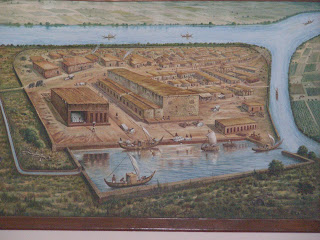Trees, birds, animals,
and all other small and tiny life forms; all accept nature as it is. Only man
does not. All other life forms also have intelligence but they all use it to
survive and not to create. It is we Humans alone who try to make it better,
think to make it better and try to achieve perfection. We get involved and get
bound by the world. That becomes the purpose of our life. We somehow foolishly want
a better experience, a perfect experience. Man has been trying to create a
better world to live in since ages. In the process he also tries to establish
his own identity. “I want to do this” and “I have done that”. But EGO for the benefit of others or EGO to
establish his own identity has separated man from nature. Education too is
directed towards creation. What has been created so far, and who has done it
gets praised. So the next generation also wants to create, wants to tamper with
nature, not simply to life of it but rather to bend it to his desire.
Definitely a lot has
been achieved in that. Progress made by science in various fields cannot be
overlooked. But scientific progress which disturbs the natural state of the
world as made available to Humans; is it good? Electricity, cement concrete,
petroleum products, newsprint are all for the benefit of man but has come after
severe exploitation of nature. All these above have become necessary for modern
living and the pressure is high to carry this forward. As more modern aminities
and facilities are available more people seem to want them. Take the case of
telecommunications. It has progressed from land telephone to mobile phone to
internet to 4G and now 5G. As demand grows, it becomes cheaper and reach
widens. But do we realize now that it operates only on electricity. Forests are
destroyed, birds and animals are destroyed, all without being replaced, just
because more population wants more land, wants more minerals, wants more food
and want more electricity. This Human desire for better facilities has disturbed
nature immensely as if it were irrelevant and inconsequential. Are Humans not a
part of this nature? Is man extra-terrestrial? Does he not feel for nature?
Does he not belong to this nature? Would not a higher and practical purpose be
served if man focused his intelligence to find out; what is life, why does the
heartbeat, how does the mind work, why does the universe exist and what is
beyond?
Sadly and with sizable
remorse I have to admit that we humans are the only selfish life form on this
planet. Coupled with that we are also the most stupid because we do not
understand our own benefit. It is very easy to be distracted by the world.
Everything around us, that which is created by nature and that which is created
by man, enters through sense organs and distracts us. It gives us a sense of being,
which is both hollow and false, that we are entities of permanent reach and
value. Everything around us distracts us from realizing our real and true
potential which is within us, which is to break free from the shackles of pain
and suffering, to real and lasting happiness. That is to merge with nature
itself.


















